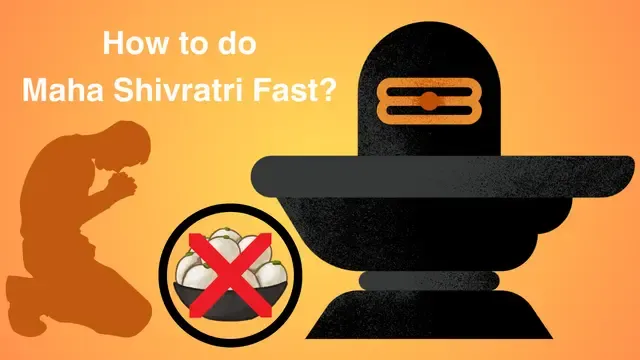How to do Maha Shivratri Fast?
Maha Shivratri, known as the Great Night of Lord Shiva, is a significant Hindu festival celebrated with great fervor and devotion.
Central to this auspicious occasion is the traditional practice of observing a fast, believed to bring immense spiritual and physical benefits.
In this guide, we will explore the depth of significance behind the Maha Shivratri fast and offer you valuable insights and practical tips on how to observe this fast to derive maximum spiritual fulfillment.
Whether you are a devout follower or someone seeking to immerse yourself in the rich cultural heritage of Hinduism, join us on this enlightening journey as we unravel the intricacies of observing the Maha Shivratri fast.
 |
| How to do Maha Shivratri Fast? |
📖 Table of Contents:
- Introduction
- Preparation before starting the fast
- Preparation for Maha Shivratri fast
- Understanding the rules and regulations for Maha Shivratri fast
- How to maintain spiritual focus and practice during fasting?
- Tips for overcoming challenges during the fast
- Conclusion
Preparation before starting the fast
Before starting the Maha Shivratri fast, it is important to prepare yourself physically and mentally.
This includes:
- Consult with a healthcare professional: If you have any health conditions or concerns, it is advisable to consult with a healthcare professional to ensure that fasting is safe for you. They can provide guidance on how to modify the fast to suit your needs.
- Mental preparation: Fasting requires discipline and determination. Take some time to mentally prepare yourself and strengthen your resolve to observe the fast throughout the day.
Preparation for Maha Shivratri fast
- Shopping for fasting ingredients: Purchase the necessary ingredients for the meals you plan to have during the fast. This may include fruits, milk, yogurt, nuts, and specific fasting-friendly staples such as singhare ka atta (water chestnut flour) and sabudana (tapioca pearls).
- Preparing the meals: Plan your meals in advance to ensure that they fulfill the restrictions of the fast. You can find recipes specifically designed for the Maha Shivratri fast that are simple and nutritious.
- Avoiding non-fasting items: Before starting the fast, avoid consuming food items that are prohibited during the fast. This includes grains, onions, garlic, non-vegetarian food, alcohol, and tobacco.
Understanding the rules and regulations for Maha Shivratri fast
- Complete fast or partial fast: Decide whether you want to observe a complete fast (abstaining from food and water) or a partial fast (consuming restricted foods once during the day). Choose the option that aligns with your physical stamina and capabilities.
- Time of fasting: The fast typically starts on the morning of Maha Shivratri and continues until the following morning. Some people also observe a strict fast from the previous evening until the next evening.
- Fasting restrictions: During the fast, certain foods and activities are prohibited. These include grains, onions, garlic, non-vegetarian food, alcohol, tobacco, and indulging in worldly pleasures. Engage in spiritual activities, meditation, and prayers instead.
READ ALSO: 10 Clear signs that Lord Shiva is with you
How to maintain spiritual focus and practice during fasting?
- Prayer and meditation: Spend time in prayer and meditation to connect with Lord Shiva and seek his blessings. Chanting mantras or reciting prayers dedicated to Lord Shiva can enhance the spiritual experience.
- Visiting the temple: If possible, visit a nearby Shiva temple to offer your prayers and participate in the festivities. Many temples organize special ceremonies and rituals during Maha Shivratri.
- Reading spiritual texts: Engage in reading spiritual texts, especially those related to Lord Shiva and his significance. This can deepen your understanding and enhance the spiritual experience during the fast.
Tips for overcoming challenges during the fast
Fasting can pose challenges, especially if you are not accustomed to it.
Here are some tips to help you overcome these challenges:
- Stay hydrated: If you are observing a complete fast, it is important to stay hydrated. Drink small sips of water throughout the day to avoid dehydration.
- Eat nourishing foods: If you are observing a partial fast, ensure that the foods you consume are nourishing and provide sustained energy. Include fruits, milk, yogurt, nuts, and fasting-friendly ingredients in your meals.
- Rest and relax: Fasting can be physically demanding, so make sure to get enough rest and relaxation throughout the day. Avoid strenuous activities and take short naps or breaks to conserve your energy.
Conclusion
Observing a fast during Maha Shivratri is a wonderful way to show devotion to Lord Shiva and seek his blessings.
By preparing yourself physically and mentally, understanding the rules and regulations, maintaining spiritual focus, and overcoming challenges, you can have a fulfilling and meaningful Maha Shivratri fast.
I have a Nirjala fast on Mahashivratri, what type of fast will you observe, please mail me. Share this article with your loved ones.
May Lord Shiva bless you with strength, prosperity, and spiritual growth.
READ MORE:
🌟 Why Lord Shiva wear tiger skin?





